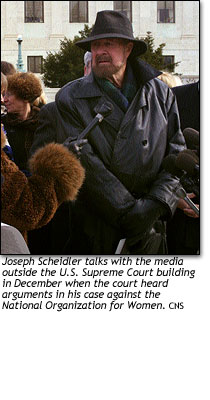 |
 |
|||||
 |
 |
 |
 |
 |
Pro-life and other protesters hail vote Supreme Court backs Scheidler against NOW By Michelle Martin Fresh from a resounding victory in the U.S. Supreme Court, Chicago-based pro-life activist Joe Scheidler is predicting a renaissance in anti-abortion activism. The court’s 8-1 ruling that protesters who sought to shut down abortion clinics could not be sued under the federal anti-racketeering law will make people who oppose abortion less afraid to aggressively share their views, said Scheidler. And the decision couldn’t come at a better time, as Scheidler believes the tide of public opinion is turning against abortion. The Feb. 26 decision, which caps nearly 17 years of litigation with abortion clinics and the National Organization for Women, only gives the pro-life movement more publicity and a bigger soapbox from which to broadcast its message. “I think this is going to bring people into the streets, and that’s where it is,” said Scheidler, whose Pro-Life Action League organizes prayer vigils and demonstrations that feature posters and literature with graphic images of aborted fetuses. “People have to see what abortion is. When they see it, it’s ugly.” On a personal level, the decision means that Scheidler, 75, and his family can keep their Sauganash home and that he won’t have to shutter league offices. He, the league and Operation Rescue had been liable for $258,000 in damages to two abortion clinics—plus all of NOW’s legal bills since the case started in 1986—under the racketeering law. The case hinged on whether the anti-abortion activists engaged in extortion against the clinics in a series of protests in the early and mid-1980s by trying to force them to shut down, thus depriving them of their right to do business and depriving women of their right to seek medical services, including abortions. In 1994, the Supreme Court ruled that the pro-lifers did not need to benefit economically to be guilty of extortion—one of several crimes that can trigger the racketeering law. After that ruling, a U.S. district court and the Chicago-based 7th Circuit Court of Appeals ruled that the clinic blockades did indeed amount to extortion. The Feb. 26 Supreme Court ruling reversed that decision, saying that the blockades could not be extortion because the activists received nothing from their actions. “Their reasoning was pretty good,” Scheidler said. “We’re not racketeers, and you can’t use an anti-racketeering law against us. This was no skin-of-your-teeth majority.” The decision was applauded by a variety of activist organizations of all stripes, who had filed briefs in support of the pro-lifers, and by Cardinal George, who hailed it as a victory for free speech. “Today’s Supreme Court decision in favor of Joseph Scheidler and other pro-life demonstrators is welcomed by all who support the American principle of peaceful protest against human rights violations and social injustice,” the cardinal said in a statement. “As I have noted previously, if the courts had been used to stop the organized sit-ins at lunch counters throughout the South in the ’60s, there would have been no civil rights movement. “I am grateful to the defendants in this case, who endured tremendous adversity to uphold the principle of freedom of speech for all Americans. The Archdiocese of Chicago will continue to support prayerful, non-violent witness against the injustice and violence of abortion. I am also grateful to the eight members of the Supreme Court who today restored common sense to this area of the law.” As for Scheidler, he plans to keep doing what he has been doing. In the two days after a WGN radio reporter alerted him to the decision—just as he sat down to a piece of cherry pie for breakfast—he did more than 45 media interviews. In that same time, members of the Pro-Life Action League continued to stand outside clinics to wave posters, distribute literature and offer “sidewalk counseling” to women entering the buildings. At one such demonstration, they saved three babies, Scheidler proudly reported. The Supreme Court decision also removes an injunction stopping the league and Operation Rescue from orchestrating the kind of clinic blockades that led to the litigation to begin with—actions where no one disputes that laws against trespassing and other actions were broken. But the injunction was largely superfluous after the passage of the Freedom of Access to Clinic Entrances Act in 1994, which restricts how close protesters can come to a clinic’s doors. Ironically, Scheidler said, he never thought the kind of large-scale blockades organized by Operation Rescue that led to the litigation were the most effective way to stop abortions. “It seemed to me to be a waste of manpower,” Scheidler said. “You would have four or five or six hundred people in front of a clinic blocking the doors, and only a few doing counseling. If you would have spread them out to different clinics and had them all doing counseling, you would stop a lot more abortions.” Still, he went along with it, he said, because it generated enthusiasm within the movement and attention from the media. That eventually backfired by spurring the passage of the FACE law and the racketeering lawsuit, which scared some people away. Scheidler hopes the Supreme Court ruling, which he believes amounts to “almost an endorsement” of the kind of activism in which the Pro-Life Action League now engages, will bring many back to the sidewalk. To keep the publicity going, he’s planning a June “Bring America Back to Life” party to celebrate the activists’ victory. “When I talk about activist groups, I mean people who go out and do something,” Scheidler said. “People who go to abortion clinics, drive trucks with the pictures of the babies, pass out literature in the Loop, people who are aggressive. … Jesus said, ‘Go and teach. He didn’t say go and sit at home and feel bad about it. He was on the street all the time.’” Front Page | Digest | Cardinal | Interview |
||